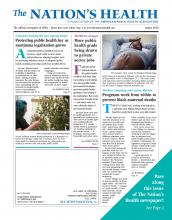Policies that widen access to social determinants of health such as reliable public transportation and affordable housing could go a long way toward improving health outcomes among U.S. Hispanic communities, according to a May report.
Researchers at Salud America, a national network for health equity housed at the University of Texas Health Science Center in San Antonio, examined the latest science on access to affordable housing, public transit and green spaces among Hispanic residents. The report noted that when combined in a community setting, the three determinants “form the foundation for healthy, active lifestyles that allow further access to work places (financial stability), health and educational resources, and social networks, all of which play a role in health equity.”
Unfortunately, the report found that Hispanics often lack access to all three resources.
“It is critical to address these underlying social, economic and environmental factors that contribute to health than to address the health disparities directly if we are to hope for long-term changes in Latino health and well-being,” said APHA member Amelie Ramirez, DrPH, MPH, lead author of the report and director of Salud America, in a news release.

Only a third of Hispanics in the U.S. are in walking distance of recreational park areas, said a report released in May.
Photo by Oscarhdez, courtesy iStockphoto
Among the report’s many findings, researchers discovered that Hispanics face particularly burdensome housing costs, with the percentage spending 30% or more of income on housing growing from more than 42% in 2000 to nearly 57% in 2015. Hispanics are also more likely to rent than their white counterparts and typically experience greater rates of eviction and involuntary displacement. On transportation, U.S. Hispanics experience longer commutes than their white peers, but are less likely to have access to a car and more likely to rely on public transit. Hispanic residents are also more likely to report unreliable, infrequent and unsafe public bus routes.

Hispanics spend a large share of their income on rent and mortgages, a new report finds.
Photo by Sladic, courtesy iStockphoto
When it comes to green space, which science has linked to improved physical activity and mental well-being, the report found that only 1 in 3 Hispanic residents live within walking distance — or less than one mile — from a park, and just one-fifth of Hispanic children have access to recreational green spaces where they live, compared to 62% of their white peers. Among the many barriers to green spaces documented in Hispanic communities were distance, lack of sidewalks and transit connectivity, a lack of park maintenance, and inequitable funding for green spaces.
“In several urban examples, including Chicago and Los Angeles, race relations have kept Latinos from using parks in their neighborhoods; a given space may be perceived as ‘belonging’ to another group in the community,” the report stated.
“When properly designed, green spaces contribute to social cohesion, which can only occur when the needs and desires of the residents using the space are heard. Green space can provide a sense of community and feelings of safety by creating vital neighborhood hubs for social interaction.”
The findings lead to policy implications, such as increasing the number of public transit routes in low-income communities, increasing affordable housing stock near revitalized transportation hubs, building sidewalks and repurposing vacant lots into recreational outdoor spaces. The report also called for more research on the needs of Hispanics living in small towns and rural communities in the U.S. South and Midwest, noting that such communities tend to be more segregated, isolated and marginalized than urban Hispanic communities.
“With proper political will and community activism, change can be made to improve access to affordable housing, public transportation and green spaces in all types of Latino communities,” the report concluded.
For more information on the “State of Latinos and Housing, Transportation and Green Space,” visit https://salud-america.org.
- Copyright The Nation’s Health, American Public Health Association












